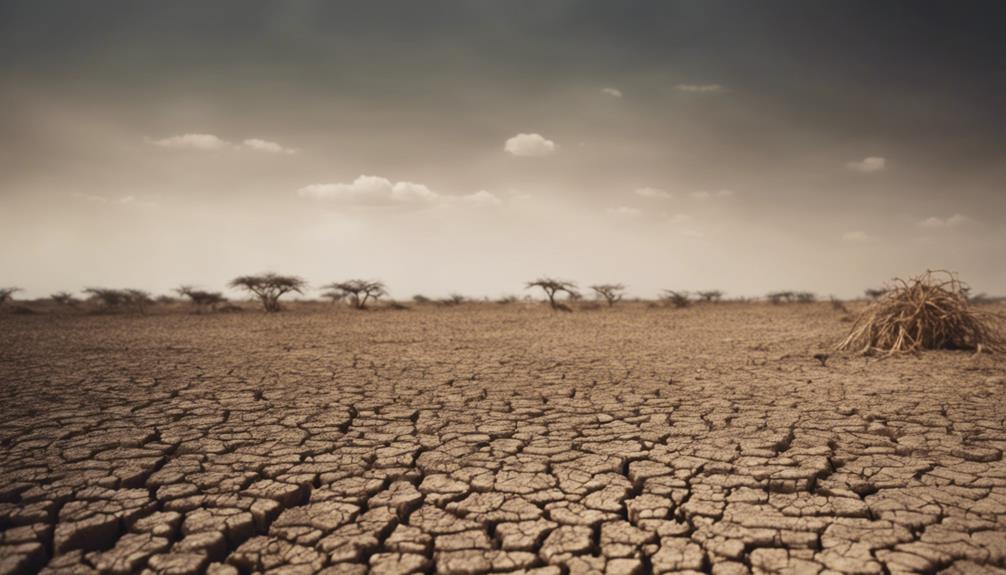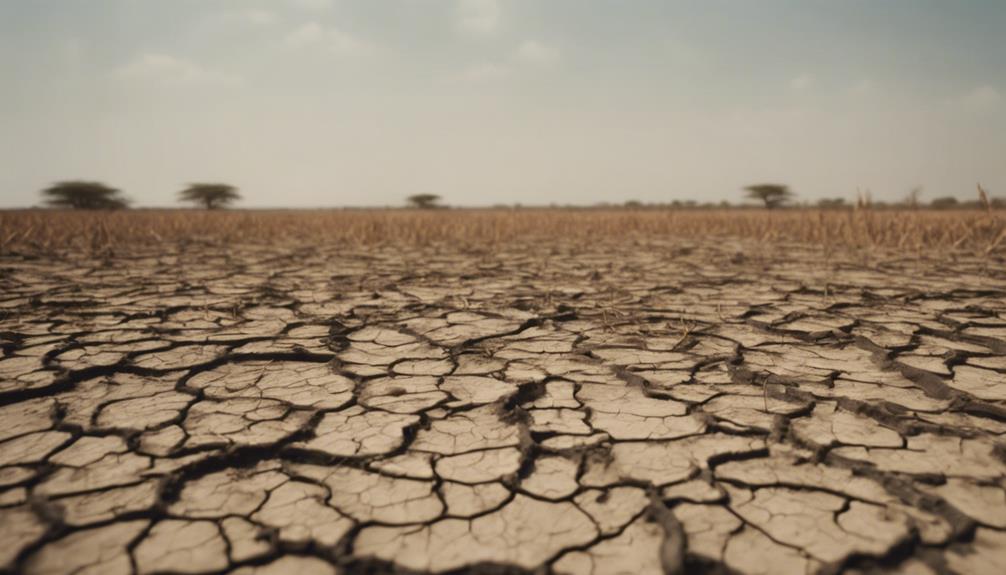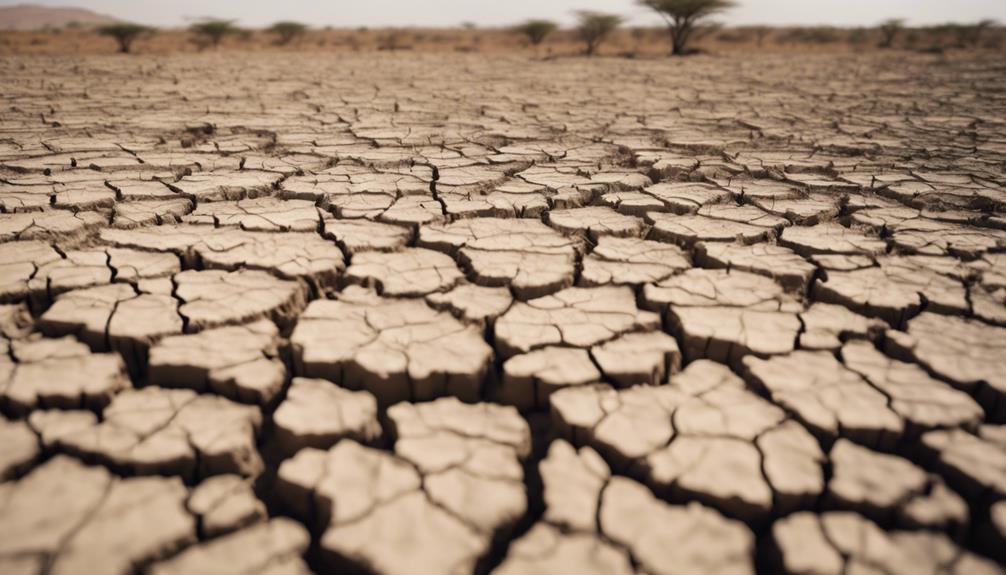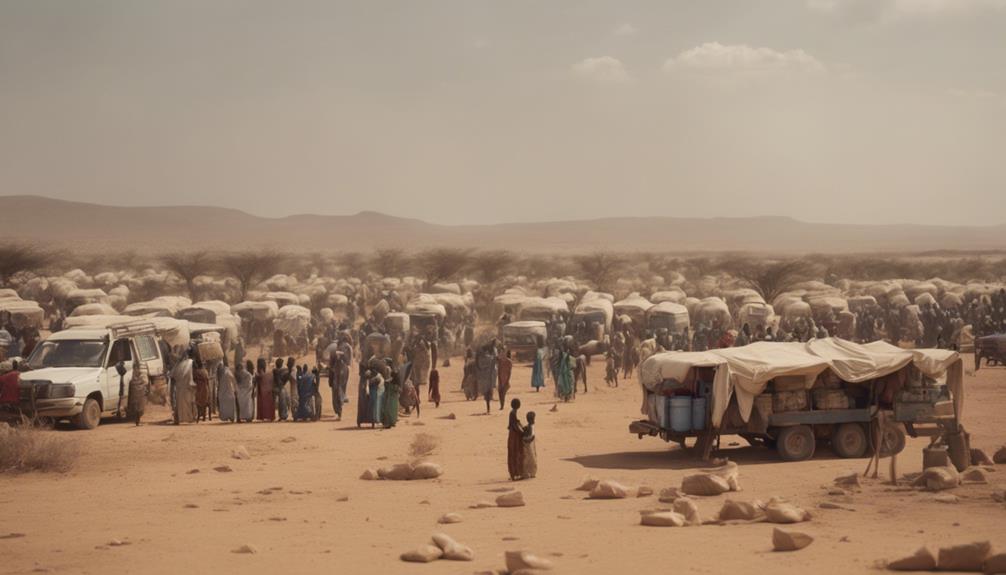The Ukraine war disrupts grain imports to Ethiopia, Kenya, and Somalia, intensifying climate emergencies in the Horn of Africa. With 67%, 89%, and 92% of wheat imports coming from Russia and Ukraine, supply disruptions in Ukraine impact the region. This leads to decreased exports, causing soaring prices for cooking oil, bread, and wheat flour. Rising food prices exacerbate vulnerability to food insecurity in the face of prolonged droughts and water scarcity. Urgent interventions are required to support affected populations and address nutrition crises. Ensuring vital food system sustainability through local agricultural investments is essential. Learn more about this critical issue.
Key Takeaways
- Prolonged droughts worsen due to Ukraine war's impact on grain imports
- Vulnerable communities face heightened food insecurity from climate crises
- Rising food prices strain resources amid climate emergencies
- Increased reliance on imported grains exacerbates food security risks
- Urgent humanitarian aid needed to address malnutrition amid climate challenges
Impact of Ukraine War on Grain Imports
The disturbance caused by the Ukraine war has greatly impacted the grain imports of Ethiopia, Kenya, and Somalia, which heavily rely on wheat imports from Russia and Ukraine. With 67%, 89%, and 92% of their wheat imports coming from these countries, respectively, the supply disruptions and agricultural risks in Ukraine are now affecting the Horn of Africa.
The agricultural production in Ukraine is at risk due to the ongoing conflict, leading to a decrease in grain exports to these African nations. Consequently, soaring prices of cooking oil, bread, and wheat flour are being witnessed in the region. Export-dependent countries like Kenya are experiencing economic challenges as a result of the Ukraine war's impact on their grain imports.
As these nations grapple with the consequences of the conflict, the need for alternative solutions to secure their food supply chains becomes more pressing.
Rising Food Prices in Horn of Africa

Amidst the turmoil caused by the Ukraine war, food prices are skyrocketing in the Horn of Africa, posing significant challenges to families in accessing affordable meals. This surge in prices is hitting essentials like cooking oil, bread, and wheat flour, making it increasingly difficult for families to put food on the table.
As prices continue to climb in local markets, the region is facing a nutrition crisis, with vulnerable communities struggling to afford basic necessities. The war accelerating climate emergencies has further compounded the situation, exacerbating the vulnerability of these communities to food insecurity.
If the trend of rising food prices persists, food insecurity is expected to worsen, pushing more families into precarious situations where accessing nutritious meals becomes a daily challenge. The record-high prices aren't only straining household budgets but also highlighting the urgent need for interventions to support those most affected by the ongoing crisis.
Vulnerability of Food Security

Exacerbating the challenges faced by vulnerable communities in the Horn of Africa, the disruption of grain imports from Ukraine due to the ongoing war has severely compromised food security in the region. With over 50% of global sunflower oil and seed trade impacted by the conflict, essential food production processes have been severely disrupted.
This disruption has led to record-high prices in local markets for staple food items such as cooking oil, bread, and wheat flour, further exacerbating the vulnerability of food security in countries like Ethiopia, Kenya, and Somalia. The limited local production capacity in the region has left these countries heavily reliant on global supply lines, making them susceptible to such disruptions.
As prices continue to rise and supply chains remain strained, the situation is projected to worsen, escalating the nutrition crisis in the Horn of Africa. The reliance on international trade for food staples is proving to be a double-edged sword, highlighting the urgent need for sustainable local food production systems to guarantee food security in the face of global uncertainties.
Climate Emergencies Exacerbate Challenges

The compounding effects of prolonged droughts exacerbated by climate emergencies in the Horn of Africa have intensified challenges related to water scarcity, food insecurity, and displacement.
- Nutrition Crisis: Over 1.7 million children in the region urgently require treatment for severe malnutrition due to prolonged drought and food shortages.
- Imported Grains: With crop failures and livestock deaths widespread, communities in the Horn of Africa are increasingly reliant on imported grains to meet their food needs.
- Climate Emergencies: Droughts lasting over 40 years have worsened in the region, impacting water availability, agricultural practices, and overall food security.
- Strained Communities: The ongoing climate crises have further strained the already vulnerable communities, exacerbating existing challenges and increasing the risk of malnutrition and hunger, especially for millions of children.
These challenges underscore the urgent need for coordinated efforts to address the root causes of the nutrition crisis and enhance resilience in the face of climate emergencies in the Horn of Africa.
Addressing Immediate Humanitarian Needs

Addressing the urgent humanitarian needs in the Horn of Africa requires immediate action to provide essential assistance to over 1.7 million children facing severe malnutrition due to the impact of climate emergencies exacerbated by the war in Ukraine.
The nutrition crisis in the region has reached critical levels, with UNICEF facing an alarming 80% funding gap for 2022 to address the pressing needs of these vulnerable children. Shortages in nutrition supplies and clean water access further compound the challenges faced by the affected population.
The lack of adequate humanitarian support not only hinders efforts to provide essential assistance but also jeopardizes the well-being of children grappling with food insecurity and malnutrition. Without prompt intervention, there's a risk of a rapid deterioration of the humanitarian situation in the Horn of Africa.
Immediate and coordinated efforts are essential to prevent further escalation of the crisis and make sure that these children receive the life-saving support they urgently require.
Ensuring Long-Term Food System Sustainability

Investing in local agricultural production and strengthening food systems is essential for ensuring long-term food system sustainability in the Horn of Africa. This region faces a nutrition crisis exacerbated by climate emergencies and disruptions in global trade due to the Ukraine war.
To address these challenges effectively, the following steps are pivotal:
- Promoting Diverse and Nutritious Crops: Encouraging the cultivation of a variety of crops rich in essential nutrients can enhance food diversity and combat malnutrition.
- Supporting Smallholder Farmers: Providing resources and technical assistance to smallholder farmers can boost local food production, increase resilience to climate shocks, and stimulate economic growth.
- Enhancing Local Market Access: Improving infrastructure and market linkages can facilitate the efficient distribution of food, benefiting both producers and consumers while reducing food waste.
- Encouraging Sustainable Practices: Promoting sustainable agriculture techniques such as conservation farming and water-saving irrigation methods can help preserve natural resources and build climate resilience in the long run.
Frequently Asked Questions
How Is the Ukraine War Affecting Africa?
The Ukraine war is impacting Africa through disrupted food supplies, particularly in the Horn of Africa. Prices of staple foods like cooking oil, bread, and wheat flour are skyrocketing due to supply chain disruptions and agricultural risks in Ukraine.
The rising costs of fertilizers and fuel worsen the food security crisis. Export-dependent countries like Kenya are facing economic challenges as food imports are affected. This war-induced situation is exacerbating existing vulnerabilities in the region.
What Is the Crisis in the Horn of Africa?
The crisis in the Horn of Africa is dire, with over 1.7 million children requiring urgent treatment for severe malnutrition. Drought, lasting over 40 years, has caused livestock deaths and crop failures, worsening food insecurity.
Rising prices of essentials like cooking oil and wheat flour exacerbate the challenges faced by countries like Ethiopia, Kenya, and Somalia. Insufficient funding for long-term solutions hampers progress in addressing the recurring climate emergencies and food security crisis in the region.
How Is the Horn of Africa Affected by Climate Change?
Climate change impacts the Horn of Africa in various ways. Droughts persist, leading to water scarcity and forced migration. Livelihoods suffer from livestock deaths and crop failures.
Malnutrition affects millions, with worsening conditions if rains delay. Vulnerability to food supply disruptions from conflicts like the Ukraine war heightens risks.
Long-term solutions are hindered by insufficient funding, exacerbating recurring climate emergencies in the region.
How Can We Help the Horn of Africa?
In the Horn of Africa, assistance is essential for addressing urgent humanitarian needs exacerbated by the Ukraine war. Immediate actions like providing nutrition supplies and clean water access are necessary for over 1.7 million malnourished children.
Long-term solutions, such as reliable water sources and social protection programs, can enhance resilience against recurring emergencies.
Global intervention is necessary to prevent further crisis escalation and support vulnerable families like Noradin's, averting looming threats like cholera and measles outbreaks.
Conclusion
In summary, the Ukraine war has accelerated climate emergencies in the Horn of Africa, leading to rising food prices and increased vulnerability of food security. Immediate humanitarian needs must be addressed while also ensuring long-term sustainability of the food system.
The challenges ahead are formidable, but with proactive measures and international cooperation, there's hope for mitigating the impact on the region's most vulnerable populations. The urgency of the situation can't be overstated, and collective action is vital in overcoming these challenges.










